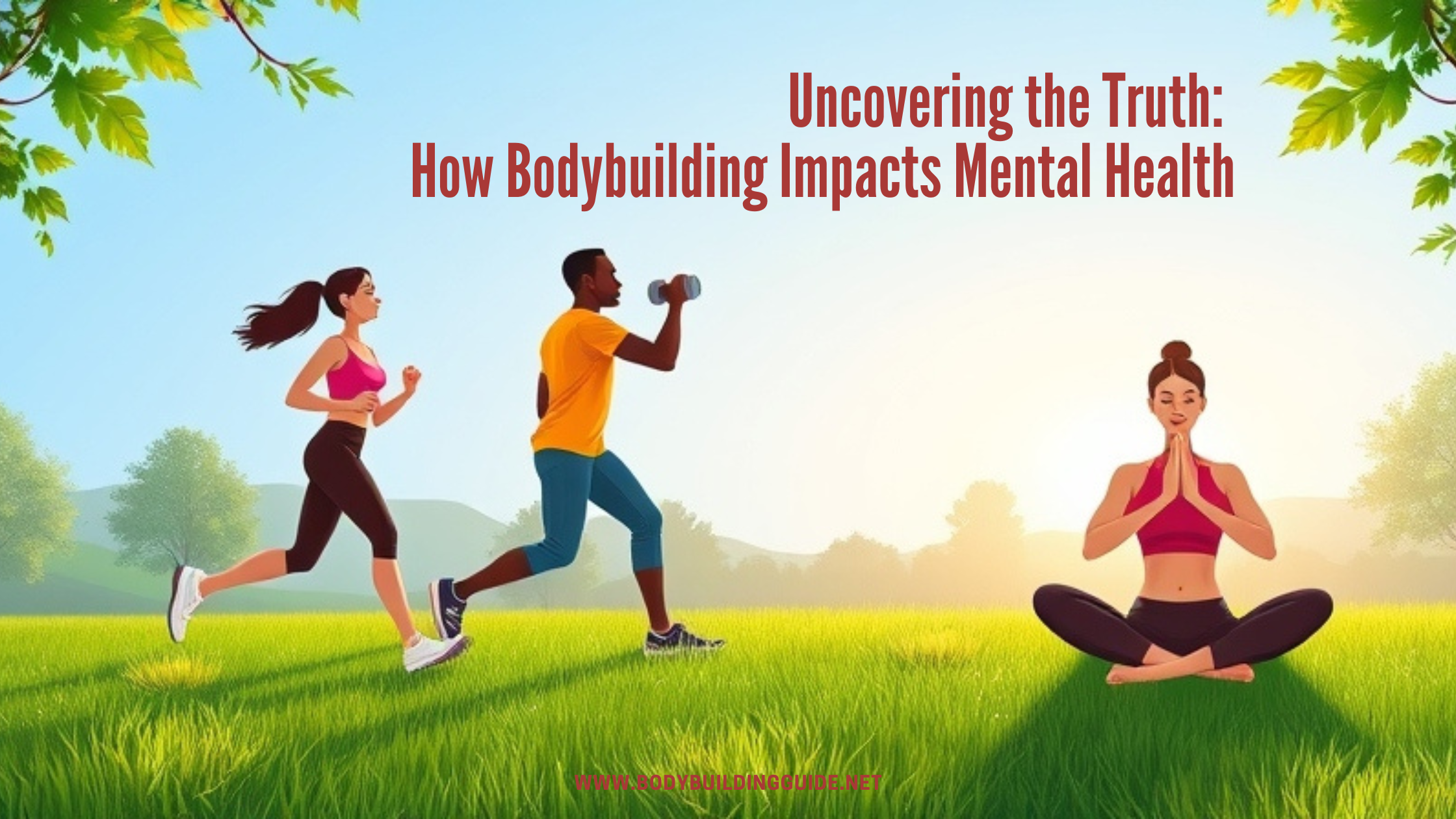Bodybuilding is usually associated with its body and physical benefits such as sculpting muscles, gaining strength, and endurance. But equally as impressive as this is the fact that it also has a significant influence on mental health. The times when mental health is one of the rising issues across the globe make this discussion between the two more worthy. This article will try to find out how bodybuilding affects mental health by diving deep into the science, fact, figure, and expert insight supporting it.
The Growing Mental Health Crisis
Mental health disorders, such as anxiety and depression, are among the leading causes of disability worldwide. As stated by the World Health Organization, more than 280 million people live with depression globally, and nearly 264 million people suffer from anxiety disorders. The COVID-19 pandemic worsened the situation, with many individuals experiencing increased stress, isolation, and mental health issues.
This surging crisis has emphasized the call for interventions that are available and work well; hence, bodybuilding becomes one of the potent weapons used against mental health disorders.
Bodybuilding as a Natural Antidepressant
- Release of Endorphins: The Feel-Good Hormones
One of the most direct benefits of bodybuilding is the endorphin release that occurs during exercise. Endorphins are neurotransmitters that help to reduce pain and induce feelings of happiness. A study published in the Journal of Psychiatric Research showed that regular resistance training had a significant effect on the reduction of symptoms of depression. Participants reported improved mood and reduced anxiety levels after weeks of consistent training.
Fact Check: According to a report from Harvard Medical School, the risk of depression is reduced by 26% by just 15 minutes of high-intensity exercise like weightlifting.
______________________________________
- Reduces Stress Levels
Bodybuilding acts as a natural stress reliever. When you are lifting weights, your body reduces levels of cortisol, the stress hormone. Chronic stress is known to be a precursor to mental health disorders, and mitigating it through bodybuilding has far-reaching effects.
Statistics to Recall: The American Psychological Association reveals that 75% of adults reported experiencing moderate to high levels of stress. Exercise, including strength training, reduces stress in 89% of those who regularly take part in fitness programs.
________________________________________
Cognitive and Emotional Benefits
- Enhanced Concentration and Memory
Bodybuilding boosts brain function by stimulating blood flow and enhancing the release of brain-derived neurotrophic factor, a protein crucial for learning and memory. According to a study published in the Frontiers in Psychology journal, resistance training improves cognitive functions, such as memory and attention, in people aged 18–55.
- Building Emotional Resilience
Engaging in bodybuilding gives one discipline and perseverance. The ability to overcome some physical challenges in the gym helps one to better cope in real life. This enables one to deal with distress more effectively.
______________________________________
Enhancing Self-Esteem and Confidence
The process of bodybuilding aids in enhancing self-image. This is the foundation for mental health. The procedure of setting fitness goals, tracking progress, and seeing change in the body can boost a person’s self-esteem significantly.
Body Image and Confidence
Research published in Psychology of Sport and Exercise indicates that those who engage in strength training show a 20–30% improvement in body image perception. This is important because body dissatisfaction is a major risk factor for developing eating disorders and depression.
Fact: A survey conducted by the National Eating Disorders Association revealed that 70% of adults feel pressure to meet a specific body standard, which is linked to anxiety and low self-esteem.
________________________________________
Social Advantages of Bodybuilding to Mental Health
The gym setting tends to be very communal. For many, bodybuilding opens up avenues for socializing, thus reducing the chances of loneliness and isolation. A strong support network is usually a buffer against mental health challenges.
Gym Culture and Support
According to a University of California study, 63% of those going to the gym said they feel more connected to their fellow gym-goers after attending group workouts or training sessions. This sense of community helps in building well-being and motivation, which are two key elements for good mental health.
________________________________________
Overcoming Common Obstacles to Bodybuilding
Despite its advantages, a lot of people are afraid of starting the bodybuilding regimen. Relieving these concerns will encourage more people to tap its mental health benefits.
- Myth: Bodybuilding is Meant for Those Physically Strong
Reality: The fact is, bodybuilding is for everybody, not just for people who can lift heavy things. Start with light weights and gradually build up. That is the safest and best way to do it.
- Myth: Expensive Equipment or Gym Memberships
Reality: Home-based exercises such as body weight, for instance, push-ups and squats with minimal or no equipment may still yield mental health benefits.
______________________________________
Bodybuilding and Mental Health: A Gender Perspective
Men and Mental Health
Traditionally, males have been unlikely to seek professional help for any mental illness because of negative social perception. Bodybuilding is an excellent non-verbal and proactive way to deal with stress and improve mood without necessarily needing to talk. It has a special attraction for males. A report published in the Journal of Health Psychology reported that the emotional well-being of the men who weightlifted had improved dramatically.
Women and Mental Health
Although people hardly consider this aspect of bodybuilding, women greatly benefit from it too. For one, it saves the ladies from the pressures placed upon them to become beauty like other standards, as the ability to gain strength surpasses all forms of body type. Studies indicate that for every woman who involves herself in resistance training has shown 35% signs of less depression and anxiety signs.
___________________________________________________
Bodybuilding with Mindfulness
Mindfulness practices while engaging in bodybuilding may expand the mental health benefits achieved through it. Bodybuilding may be transformed into meditative practice through breath awareness, mindfulness of movements, and full presence during exercise.
Mindful Strength Training
A 2022 study published in Mindfulness and Physical Health revealed that individuals who used mindfulness in resistance training had a 25% greater reduction in anxiety symptoms compared to those who trained without mindfulness.
________________________________________
Nutrition Role in Bodybuilding and Mental Health
Nutrition is the most significant factor that can optimize the mental benefits of bodybuilding. A well-balanced diet with proteins, healthy fats, and complex carbohydrates is helpful for both physical and mental performance.
Key Nutrients for Mental Health
- Omega-3 Fatty Acids: They are found in fish and nuts and support brain function, reducing symptoms of depression.
- B Vitamins: They are important for energy production and stress regulation, found in whole grains, eggs, and leafy greens.
- Tryptophan: An amino acid present in proteins, stimulating the production of serotonin. That would explain the sense of happiness.
________________________________________
Successful Application Stories
Case: The Recovery from Depression due to Bodybuilding
John, 35, an application software engineer, experienced very strong depression. Six months later, he had more confident and energetic mood with six months of bodybuilding exercise. This story reveals the changing capability of bodybuilding in the psyche of the person.
Social Effects
Many gyms in the local area hear stories of members who, through regular training, overcome enormous mental health issues and thereby inspire others.
Bodybuilding is much more than a physical activity. It is a powerful tool that can be used to help improve mental health. Bodybuilding releases endorphins, builds self-esteem, and addresses other dimensions of psychological well-being. It has the potential to be the cornerstone in the fight against mental health disorders with growing awareness and accessibility.
To all who may want to begin, the path may seem arduous, but the benefits surely outweigh the struggles. From a gym to home, lifting weights could be the first step toward better mental health.
Let’s change the script: bodybuilding is not just about building muscles-it’s about building a healthier mind and life.
________________________________________
References
- World Health Organization (WHO) – Depression and Anxiety Statistics
- Harvard Medical School – Exercise and Depression
- Journal of Psychiatric Research – Effects of Resistance Training on Depression
- American Psychological Association – Report on Stress and Physical Activity
- Psychology of Sport and Exercise – Body Image in Strength Training
- University of California – A Study on Gym Community and Well-being
- Frontiers in Psychology – Cognitive Effects of Resistance Training
8. Mindfulness and Physical Health – Anxiety reduction with Mindful Training











Really nice style and design and superb content, very little else we require : D.
I’m really enjoying the design and layout of your website.
It’s a very easy on the eyes which makes it much more
enjoyable for me to come here and visit more often. Did you hire
out a designer to create your theme? Great work!
My page … nordvpn coupons inspiresensation – https://t.co/eVysfVwFqe,
Good post. I learn something new and challenging
on sites I stumbleupon on a daily basis. It will always be useful to read through content from other writers and practice something from their websites.
Here is my webpage … nordvpn coupons inspiresensation
Great article! We are linking to this particularly great content on our site.
Keep up the good writing.
Feel free to visit my web blog nordvpn Coupons inspiresensation
I truly love your site.. Very nice colors & theme.
Did you make this amazing site yourself? Please reply back as I’m planning to create my very own site and want to find out where you got this from or what the theme is
named. Many thanks!
Stop by my blog post; nordvpn coupons inspiresensation
nordvpn 350fairfax
Why visitors still use to read news papers when in this technological globe all is presented
on net?
jmsuzp
vlq860
lj0dar
3ftjrq
Regards for helping out, good info. “Riches cover a multitude of woes.” by Menander.
vardenafil hydrochloride 10mg levitra plus levitra multiple
f41c4t
Greetings! I’ve been following your blog for some time now and finally got the bravery to go ahead and give you a shout out from Huffman Texas! Just wanted to tell you keep up the good job!
45oh1b
oq3hph
I every time spent my half an hour to read this website’s
articles or reviews everyday along with a mug of coffee.
Feel free to surf to my web-site … eharmony special coupon code 2025
39urmp
The next time I read a weblog, I hope that it doesnt disappoint me as much as this one. I mean, I do know it was my option to learn, however I really thought youd have one thing interesting to say. All I hear is a bunch of whining about something that you may repair in case you werent too busy searching for attention.
This blog was… how do you say it? Relevant!! Finally I have found something
that helped me. Thanks a lot!
my web site – vpn
Hello just wanted to give you a quick heads up. The text in your article seem to be running off the screen in Chrome. I’m not sure if this is a formatting issue or something to do with internet browser compatibility but I thought I’d post to let you know. The design look great though! Hope you get the issue fixed soon. Cheers
fniny7
Hello there, just became aware of your blog via Google, and found that it is truly informative. I’m gonna be careful for brussels. I’ll appreciate if you proceed this in future. Lots of other folks might be benefited from your writing. Cheers!
272brw
I know this if off topic but I’m looking into starting my own weblog
and was curious what all is needed to get setup? I’m assuming having a
blog like yours would cost a pretty penny? I’m not very web savvy so I’m not 100% sure.
Any recommendations or advice would be greatly appreciated.
Appreciate it https://tinyurl.com/2ygltljs gamefly 3
month free trial
Everything is very open with a clear explanation of the challenges.
It was really informative. Your site is very useful. Thanks for sharing!
Vpn what is it https://tinyurl.com/24dyn2m6
2wn332
5xuhwk
Hey! I know this is kinda off topic however I’d figured I’d ask.
Would you be interested in exchanging links or maybe guest authoring a blog
article or vice-versa? My site discusses a lot of the same topics as yours and I feel we could greatly benefit
from each other. If you’re interested feel free to shoot me
an email. I look forward to hearing from you!
Superb blog by the way!
If you are going for most excellent contents like myself, only visit
this site everyday because it offers quality contents, thanks
x0ikjg
qa6x7z
vg9ipv